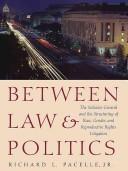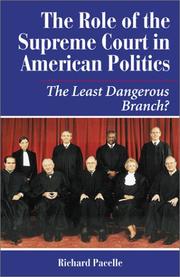| Listing 1 - 8 of 8 |
Sort by
|

ISBN: 1299052177 9781585448931 1603447016 1585448931 9781585448937 9781603447010 1585442348 9781585442348 9781299052178 Year: 2003 Publisher: College Station Texas A & M University Press
Abstract | Keywords | Export | Availability | Bookmark
 Loading...
Loading...Choose an application
- Reference Manager
- EndNote
- RefWorks (Direct export to RefWorks)
Using interviews with solicitors general and their staffs and analyzing Supreme Court cases, Pacelle looks at three hotly contested policy areas-race, gender, and reproductive rights-to see how the office balances the goals of the president, Congress, and the Supreme Court.
Law --- Reproductive rights --- Birth control --- Sex discrimination --- Race discrimination --- Civil rights --- Political questions and judicial power --- Reproductive freedom --- Sexual rights --- Abortion --- Contraception --- Human reproduction --- Involuntary sterilization --- Law and politics --- Discrimination, Sexual --- Gender discrimination --- Sexual discrimination --- Discrimination --- Sexism --- Gender mainstreaming --- Political aspects. --- Law and legislation --- United States. --- Solicitor General (U.S.) --- U.S. Solicitor General

ISBN: 0813383765 Year: 1991 Publisher: Boulder (Colo.) : Westview press,
Abstract | Keywords | Export | Availability | Bookmark
 Loading...
Loading...Choose an application
- Reference Manager
- EndNote
- RefWorks (Direct export to RefWorks)
Judicial review --- Political questions and judicial power --- History

ISBN: 0429975511 0813345707 1429487992 9781429487993 9780813345703 0813367530 9780813367538 Year: 2002 Publisher: Boulder, Colo. Westview Press
Abstract | Keywords | Export | Availability | Bookmark
 Loading...
Loading...Choose an application
- Reference Manager
- EndNote
- RefWorks (Direct export to RefWorks)
Concern for the appropriate role of the Supreme Court as a policy maker has been one of the most enduring questions of American politics. Richard Pacelle traces the historical ebb and flow of the Court's role in the critical issues of American politics: slavery, free speech, religion, abortion, and affirmative action.

ISBN: 0813367530 Year: 2002 Publisher: Boulder Westview Press
Abstract | Keywords | Export | Availability | Bookmark
 Loading...
Loading...Choose an application
- Reference Manager
- EndNote
- RefWorks (Direct export to RefWorks)
Book
ISBN: 9780415894302 Year: 2015 Publisher: New York London Routledge
Abstract | Keywords | Export | Availability | Bookmark
 Loading...
Loading...Choose an application
- Reference Manager
- EndNote
- RefWorks (Direct export to RefWorks)
Book
ISBN: 9780511843501 9780521888974 9780521717717 9781139092838 1139092839 1139090917 9781139090919 051184350X 0521888972 052171771X 1139090011 9781139090018 1139088580 1107219337 1283193272 9786613193278 1139092324 1139091816 Year: 2011 Publisher: Cambridge ; New York : Cambridge University Press,
Abstract | Keywords | Export | Availability | Bookmark
 Loading...
Loading...Choose an application
- Reference Manager
- EndNote
- RefWorks (Direct export to RefWorks)
"There are three general models of Supreme Court decision making: the legal model, the attitudinal model and the strategic model. But each is somewhat incomplete. This book advances an integrated model of Supreme Court decision making that incorporates variables from each of the three models. In examining the modern Supreme Court, since Brown v. Board of Education, the book argues that decisions are a function of the sincere preferences of the justices, the nature of precedent, and the development of the particular issue, as well as separation of powers and the potential constraints posed by the president and Congress. To test this model, the authors examine all full, signed civil liberties and economic cases decisions in the 1953-2000 period. Decision Making by the Modern Supreme Court argues, and the results confirm, that judicial decision making is more nuanced than the attitudinal or legal models have argued in the past"--
Judicial process --- Political questions and judicial power --- United States. --- Supreme Court (U.S.) --- Chief Justice of the United States --- Supreme Court of the United States --- 美國. --- Decision making. --- Social Sciences --- Political Science
Book

ISBN: 9781685856144 Year: 2022 Publisher: Boulder
Abstract | Keywords | Export | Availability | Bookmark
 Loading...
Loading...Choose an application
- Reference Manager
- EndNote
- RefWorks (Direct export to RefWorks)
Digital

ISBN: 9781685856144 Year: 2022 Publisher: Boulder Lynne Rienner Publishers
Abstract | Keywords | Export | Availability | Bookmark
 Loading...
Loading...Choose an application
- Reference Manager
- EndNote
- RefWorks (Direct export to RefWorks)
| Listing 1 - 8 of 8 |
Sort by
|

 Search
Search Feedback
Feedback About UniCat
About UniCat  Help
Help News
News